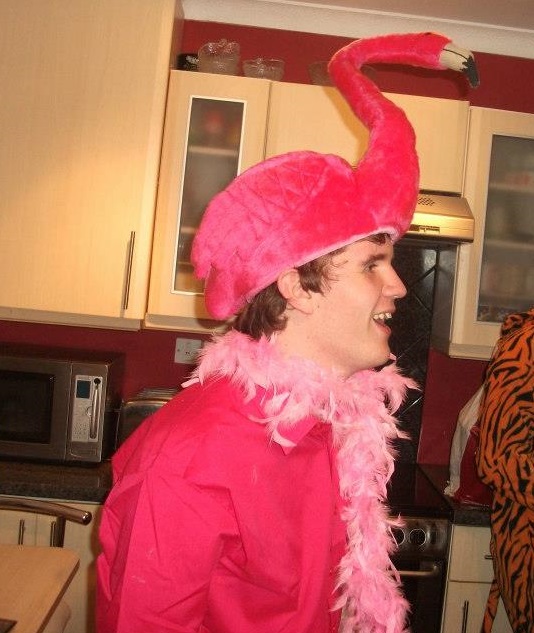We’re all animals when it comes down to it. But is the use of animal comparisons in description and character development useful and effective? Or just lazy and unimaginative?
One of my absolute favourite parties that I went to was animal-themed, which I attended as a flamingo, as the photo above evidences. Since then, I adopted the animal as part of my persona – flamboyant and decidedly elegant when it suits. One thing I have never done in any of my work (so far) is compare a character to a flamingo. A wealth of other animals do feature, however.
Animals are great descriptive devices. Not just for the looks and movements of a character, but also for their thought processes and to an extent, even their overall personalities and the reasons why they interact with other characters a certain way. A lot of what I call “Literary Snobs” deem this as lazy and unimaginative, but I think it works beautifully if used creatively, rather than the same old clichés that you come to learn at school.
A few of my favourite authors use it to varying degrees. Victor Hugo has a lovely, considerably-sized passage in Les Misérables that muses on how everyone has some form of animal in their nature. It comes as he introduces the novel’s primary (misguided) antagonist, Inspector Javert.
Granted the supposition that in every man there is contained a species of the animal kingdom, we may at once place Inspector Javert. The Asturian peasants believe that in every wolf-litter there is a dog-whelp which the mother kills, because otherwise when it grows larger it will devour the rest of her young. Endow this dog with a human face, and you have Javert.
Les Misérables, Part 1, Book Five, Chapter IV
Jean Valjean, the protagonist of the novel, is likened to a wolf, on a number of occasions throughout the story, primarily to symbolise the criminal (and you can read more about that in this article).
The wolf is a pretty easy one to go to – you hear of lone wolves all the time in real life. But what about other mammals? Or birds? Or shellfish? J.K. Rowling memorably compares Severus Snape (my favourite character) to an overgrown bat more than once, while her librarian Irma Pince is likened to “an underfed vulture.” It works superbly, especially when used so creatively. You can immediately picture what these characters are supposed to look like.
Philip Pullman takes the use of animalistic imagery to the next level in the His Dark Materials books, wherein every human (or witch) is partnered with a daemon – an animal familiar that embodies their personality. I expect the flamingo would come into play again for me here if we started assigning daemons to our own friends and family…
Animals are also prevalent in Dickens’ work, which is, as you may know, one of the key inspirations to my own novels. In Little Dorrit, fearsome antagonist Jeremiah Flintwinch is referred to more than once as “crab-like”. More specifically, “…the little keen-eyed crablike old man.”
The main anti-hero for the upcoming The Berylford Scandals: Sin & Secrecy – Abel Stirkwhistle – is partly inspired by Flintwinch. In this novel, we find Abel approaching his sixties and still suffering the disastrous effects of a stroke, including an awkward and jagged way of movement. So, as a partial homage to Dickens and Flintwinch, I decided to really play up the crab comparison. As time goes on, you may see this description evolve, and he becomes less of your beach variety of crab and more of a sea monster.
Abel isn’t the only character to get the animal treatment in some form. When we first get re-introduced to Lady Vyrrington, she is compared to a slightly rheumatic swan, while Mrs Haffisidge retains her mouse-like qualities from the first book.
There is also a degree of “hunter and hunted” about this story, so I have used a lot of predator and prey-based imagery. Mice and cats or hawks, rabbits and foxes, flies and spiders.
What do you think? Are spirit animals a great way to envisage a character? Or is it unimaginitive? What animal would you liken yourself to? Let me know in the comments below. And for more news and content or to get in touch, please follow my Facebook, Twitter and Instagram pages.




